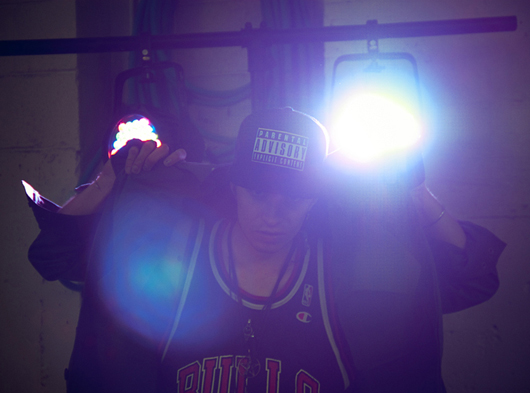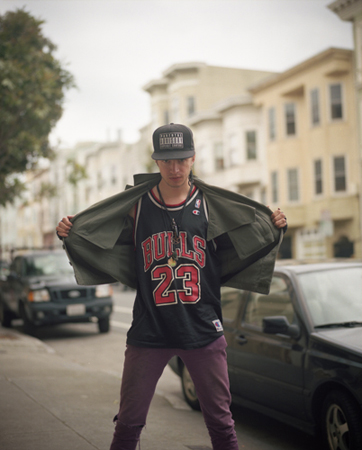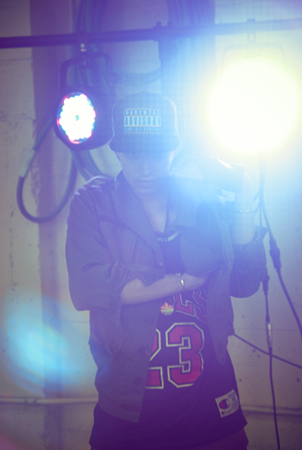Get Physical: On his new album, Pictureplane contemplates mysticism, feeling, and the power of touch.
On his last album, 2009’s stunning Dark Rifts, Travis Egedy (a.k.a. Pictureplane) proved he was […]

Get Physical: On his new album, Pictureplane contemplates mysticism, feeling, and the power of touch.
On his last album, 2009’s stunning Dark Rifts, Travis Egedy (a.k.a. Pictureplane) proved he was […]

On his last album, 2009’s stunning Dark Rifts, Travis Egedy (a.k.a. Pictureplane) proved he was a steady hand when it comes to blurring genres, creating a super-vibey dance record from some unexpected sources. (Fleetwood Mac samples, anyone?) But with his latest, Thee Physical, which comes out tomorrow on Lovepump United, he extends that pastiche to meld his deconstructions of hip-hop, diva house, and pop music with a sensibility that’s as rooted in mysticism as it is in the “real.” Last month, on a west coast visit to shoot a video for “Post Physical” in LA (he calls Denver home), he stopped through San Francisco for a chat about Genesis P-Orridge-style magick, his hip-hop-obsessed youth, and what it really means to be soulful.
XLR8R: You were just in LA doing a video?
Pictureplane: Yeah, it was for “Post Physical,” which is on my new record.
I wanted to ask you about that song, because if you do a surface read of the title, it seems like it’s about—I hate this phrase—body politics.
I like making things that are conceptually cohesive—especially albums. I like the idea of a concept record, and all my visual artwork is very conceptually based and so this record was really about, to me, the human hand as a symbol of how we experience the physical world—like all-sensory, really. It’s an album about physical touch, basically, and communicating through your hands, and all the things that go along with feeling and touch, like fetishism and sensation—like how things feel physically. So it’s called Thee Physical and it deals with the physical plane.
I was reading it as a transformative kind of thing.
Definitely. That word is such a central theme to everything I do, kind of—transformation. It’s really important to me, and I love thinking about the future of humanity and evolution, like, where we’re going as a species, in a positive way, and change.
When you read a word that’s “post-something,” you sort of assume there’s a theoretical concept involved, and I want to know how you define “post-physical.” Is it informed by different philosophies? Mysticism? Structuralism?
I am into mysticism. And “post-“, to me, it’s like an art term also. So post-physical was like the idea of ‘beyond a physical body,’ kind of. I don’t want to say “after the physical,” because that denotes death or the afterlife or something, and that’s not really what I’m trying to say. It’s more like the spiritual plane, I guess, or like what’s beyond what you can see and touch. But I guess “post-” really means ‘after,’ and maybe it could be ‘after the physical,’ when we’re sort of post-humans—when we’re not what we would call human anymore. I like post-human theory and futurist ideas of using us as a technology and where we’re going with that.
I feel like artists like Genesis P-Orridge really embody the post-physical idea, and I wonder if he’s influential to you at all?
Actually, Genesis is a huge influence on me. The past couple years I was really into reading his writings. I was really getting into chaos magic writings. I don’t remember how I discovered Psychic TV, really. I’ve always been into noise and industrial stuff, and I think I found out about Psychic TV like not even musically—I found out about them through magic. Genesis P-Orridge I think is one of the more important philosophers of the last 100 years, I would say. Just his central theme of understanding of the self and its magical possibilities, of being a pure individual, and social deconditioning and removing yourself from all of the mind pollution everywhere—not being a drone in society. His stuff, his performance artwork, his whole life has been crazy—just really influential to me.

Prior to that, did you have others kinds of life experiences that led you in that way of discovering self identity and awareness?
You know, I’m not really sure. I always sort of did my own thing, and always had an interest in the hidden, the occult, and the unseen, and I think I got into following my own path by just doing what felt right. I was always a very intuitive person before I even knew what that meant or why that was important. I’m just really interested in, like, being me, kind of. I think a lot of adults lose that as they get older—it’s really a childlike thing. As a child, you don’t really think of things like that—you’re just who you are and you just do what you do. You have a personality, and then as you get older, there’s a lot of pressure: You have to get a job, you have to buy things, pay rent, you get sort of molded into these boxes, basically. I never wanted to be molded into a box at all.
You moved to Denver for school, but what was New Mexico like growing up?
It was funky, man. Northern New Mexico is a very sort of new-agey place; a lot of hippies moved there and settled there. It’s an extremely beautiful place; I spent a lot of time outside in the mountains. It’s got a crazy culture there. A lot of Native American history, and Hispanic culture. There’s just like a Santa Fe style.
How did your parents end up there?
They left college on the east coast in the early ’70s and just headed west and settled there.
Are they hippies too?
They were. No longer.
I guess in that respect, I’m curious as to how you grew up.
I was a hip-hop kid; I was obsessed with rap in high school. Like indie rap—the weirder, the better. But that’s like when that stuff was actually—like I was real big on Anticon, in like early 2000s, and I started making rap.

I feel like when I listen to Pictureplane, there are so many reference points, but what it’s mostly about is a vibe. And I wonder if that is sort of the product of hippie-ish environs and being in the club and being into dance music as well.
I think a lot of musicians don’t understand vibe—it’s an abstract word—and no one really does. It’s a feeling. But I’ve always liked music that has a special energy to it—it’s more real, or like something you can feel. And I don’t know if two people could ever really agree on what that is necessarily, but it’s an intuitive feeling I guess. And like creating a mood in a whole room, and being able to affect people’s moods and energies; music is really conducive to being able to do that. And a lot of people will just make music, but it’s just cold, it’s real vapid, and others will make something that actually touches your soul—it’s soul music. Lots of music has it, a lot of music doesn’t. Different genres, too—it doesn’t matter what kind of music it is. It can either really have soul, or not.
I get that a lot from your music, too. It’s clearly cheaply produced and is referential of all those things that generally get associated with being soulless music, but there’s still something pretty soulful about it. It’s not soulful in the Curtis Mayfield-soul way, but it’s vibe-soul.
It’s not cheaply produced because it’s fashionable, either. It’s just how it is; it’s how I’ve always done it. Really ghetto.
You made this new record in LA with the HEALTH guys?
Well, I made it all in my room like I normally do, in my bedroom, but then I went to LA and Jupiter [Keyes from HEALTH] helped me a lot to mix everything down. We dissected every single song and just really beefed up everything. I can’t do that in the program I use—it’s really old and very limited—so he just made everything sound really good, and then I re-recorded all the vocals using a nice microphone (which I never do, either), so it sounds a lot better.
What do you use at home?
I just have this cheap mic and I run it through an amplifier. And I don’t have like a vocal booth or headphones, so I just sing over top of the song being played really loud. So you get my voice and a bunch of just background noise. But that’s how I always made tracks, so it’s always muffled, and people can never understand what I’m saying or anything.
But that’s part of its charm, right?
Yeah, so we wanted to keep that dirtiness but also make it big and club-ready, kind of. Like actually produce it well.

I’m also curious what got you into dance music.
Well, I just got like really disillusioned with the hip-hop scene; it got so annoyingly stagnant. It wasn’t moving anywhere. I’ve always been really experimental with my interests and approach, and it was just so boring. Everyone was the same, it was really misogynistic, homophobic, like just not open at all. Which is ironic, because the indie rap kids were supposed to be like fighting back against the mainstream, and it just completely flipped around—the mainstream ended up being more progressive than the underground was. And so, yeah, I’ve always liked dance music. I would listen to trance and electronic music in high school and I just got more and more disillusioned by hip-hop and more and more interested in dance music. And then in the early 2000s, I was really into dance punk. And all those bands broke, like The Rapture, The Faint, and stuff. So that started affecting my production, and I started making faster tempos and stuff. And then I started looking at the history of dance music and it just went from there.
Did you go to a lot of raves? Denver seems like a kind of ravey city.
I was not a raver. Denver does have this crazy history of raves, actually. The guy from Hercules & Love Affair [Andy Butler]… he grew up in Denver, and talks about these legendary raves in Denver in the ’90s and stuff and this huge scene, but I wasn’t there then, and my parents wouldn’t really have let me go to a rave, I don’t think, when I was really young. I went to some things, but they weren’t really that ravey, though. I discovered that later.
I feel like the dance-music touchstones in your music… I wonder how filtered they are, because trance isn’t the kind of thing that dance-music purists would touch with a 10-foot pole—and indie people, too—but you have it in there and make it work, and I wonder if it’s like a conscious thing.
Trance rules, man!
Well, I’m curious as to what you like about it.
It’s big and emotional. It’s, like, awesome, and sure it’s cheesy, but a good trance song? There’s nothing better that that. A lot of it’s shit, of course, but that’s with anything. Just these epic, cascading build-ups—it’s music about a feeling. Like, you could start crying at a sick, epic trance breakdown. [laughs] And it’s ecstasy music. It’s supposed to be fun. I’ve always liked drug culture and drug music, kind of, and trance is just [part of] a long lineage of psychedelic music.
What do you look for in music to appropriate? I guess, as you say, part of it’s emotion.
I don’t know. Whatever strikes my ear. I’m not gonna go digging around in country-record crates or anything like that, but it’s, like, soul music—as we said, whatever that means.
When you were into hip-hop, did you do anything like that? Scratch DJing or crate digging?
No, I was an MC and a producer. The weird thing about “Goth Star” [from Dark Rift, which samples Fleetwood Mac’s “Seven Wonders”], what people don’t know about that song, is that I started that beat when I was in high school, when I was sampling stuff like Fleetwood Mac. I would probably never sample a Fleetwood Mac song now. It just was still on my computer and I never did anything with it, and then a couple years ago I just opened up that file and just like made the song. It just clicked, kind of, but I’d been working on it for years… When I sample now, I sample trance songs, vocal house stuff. That’s what I look for—vocals.
What do you like these days, just to listen to?
A lot of stuff. I’m really all over the place. Last year I was big on Night Slugs stuff, ’cause I DJ a lot, too. They were just flawless, everything they did. A lot of UK funky, I still love to play that out. A lot of grime stuff. I love British, forward-thinking club stuff—the different rhythms, the time signatures, the step.
Do you find touring in Europe a lot different in terms of the audiences that are coming to see you there?
Yeah, I think Europe is just sort of starting to understand the concept of like—I do like a weird bedroom punk-rave kind of thing, and I think that’s like a weird concept over there. They have just a very different history of electronic music over there, so things that are maybe weird or ironic to them, as Americans, we fully embrace it unironically, like things like trance or something, whereas they grew up with it and it’s culturally saturated over there, and here, we’re sort of toying around with these ideas just because it sounds new to our ears or something. And so I think my music is kind of misunderstood a bit in Europe, or they’re a little slow to catch on to it. I don’t really know how they interpret it, but it’s weird seeing like a dance producer playing. Like, I’m a performer, I play live and I sing, and I think they’re like, “Well, is he a DJ? What is he doing? Why is he singing?” Because electronic music, I think, it’s only DJs there. Like, huge clubs, that’s their idea of dance music. You go to a massive club and you rave all night; it’s not a performance. So it’s weird; there’s a disconnect, kind of.
So what’s the ideal live setting for you then? I get the sense that it’s just like a smaller party.
Yeah, that’s what I like. Like smaller clubs that are full of like artsy people. I mean, I consider myself a performance artist; I studied that in school. And Pictureplane is kind of a performance-art project to me; I just happen to make music for it also.
Thee Physical is out now.

